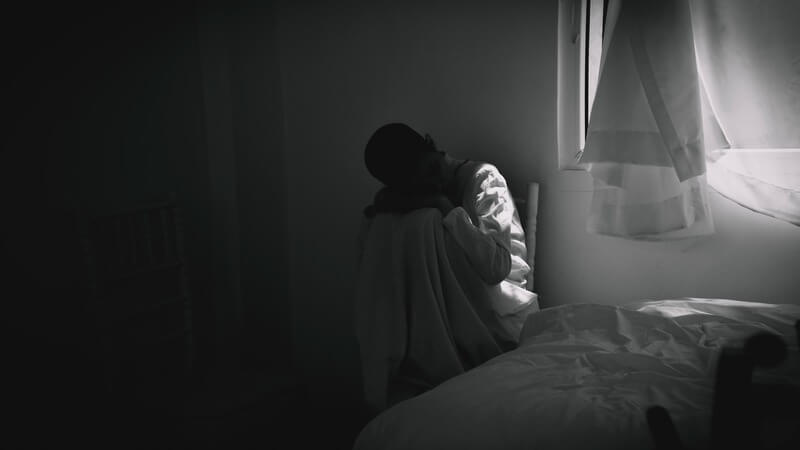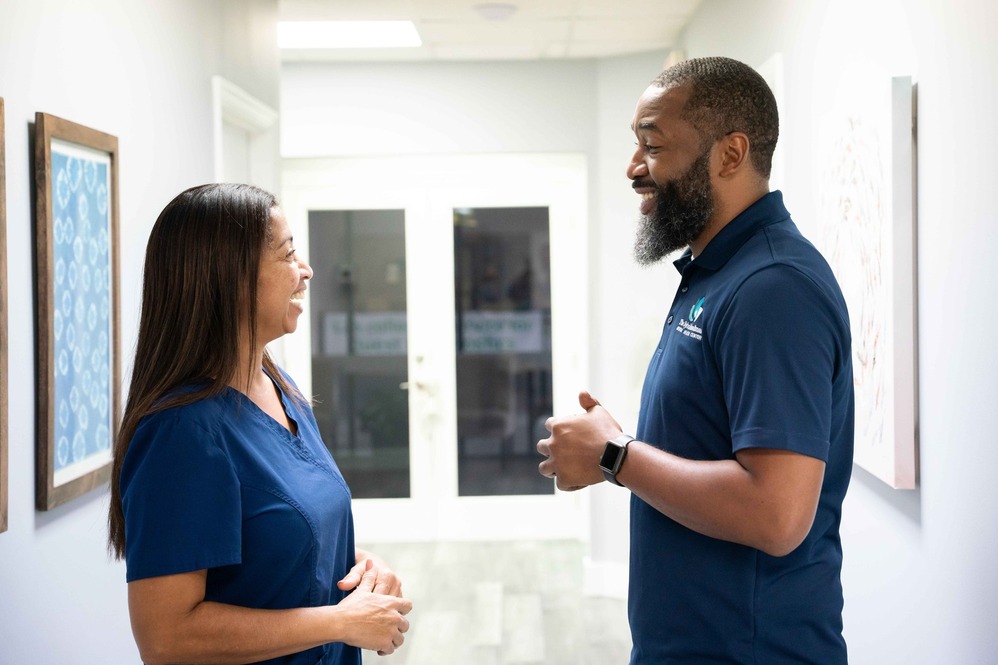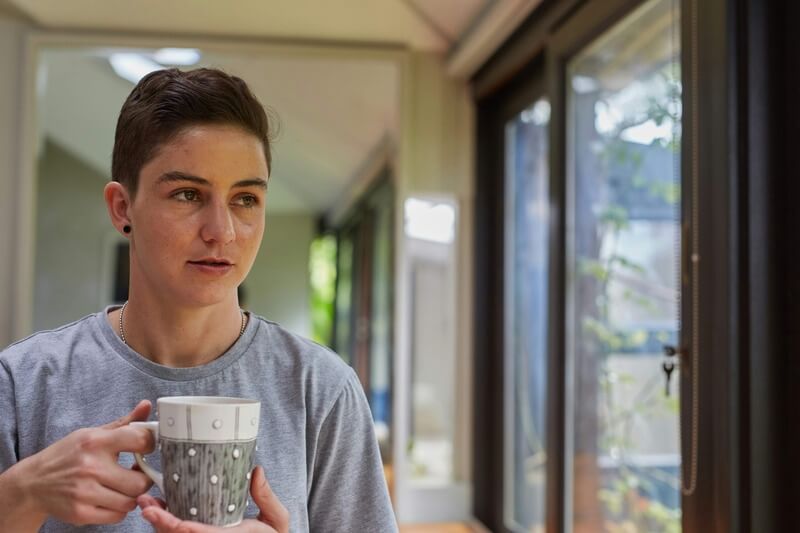Are you or someone you love suffering from sleep disorders known as parasomnias? You may benefit from a parasomnias treatment center in Fort Lauderdale, Florida. What are parasomnias? On this page, learn how outpatient therapy and other behavioral health services can address these abnormal sleep behaviors. For immediate access to accredited, quality mental health care, call us below.

Parasomnias (Sleepwalking, Nightmares) Counseling and Therapy Treatment Center in Fort Lauderdale, Florida
What is Parasomnia?
Parasomnias are sleep disorders involving unusual behaviors or experiences during sleep or the transitions between wakefulness and sleep. Parasomnia symptoms involve sleep disruptions such as sleepwalking (somnambulism), sleep terrors (night terrors), nightmares, and acting out dreams, as seen in (Rapid Eye Movement) REM Sleep Behavior Disorder (RBD).
Understanding parasomnia requires attention to its symptoms and contributing factors. Non-REM parasomnias, like sleepwalking and sleep terrors, typically occur in the early stages of sleep. For example, confusional arousals are a type of non-REM parasomnia where individuals partially wake up in a disoriented, confused state, often unable to recognize their surroundings or remember the episode. These episodes typically occur during deep sleep in the early part of the night and may involve slow, uncoordinated movements or mumbling without full awareness. Meanwhile, REM sleep behavior disorder happens during dream-filled sleep.
Parasomnia can result from various factors, including genetic predisposition, stress, sleep deprivation, or irregular sleep schedules. Disruptions in the brain’s transitions between sleep stages, particularly in REM and non-REM sleep, are often at the root of these disorders. Improving sleep hygiene—maintaining consistent sleep schedules and a calm environment—can reduce episodes. Consulting a sleep specialist is key if parasomnia disrupts daily life.

What Are Common Types of Parasomnias?
Parasomnias encompass a variety of unusual behaviors or experiences that occur during sleep, often disrupting the sleeper and, at times, those around them. While there are many types of parasomnias, some are more common and widely recognized. Below are a few examples, though this list is not exhaustive, as parasomnias vary significantly in presentation and cause.

What Are the Triggers and Causes of Parasomnias?
Parasomnias can be triggered by various factors, including stress, sleep deprivation, and inconsistent sleep schedules. Other causes may include underlying medical conditions, such as sleep apnea, or neurological disorders that disrupt sleep cycles. Certain medications, substance use, or even genetics can also contribute to the onset of parasomnias.
Understanding the triggers and causes is key to managing parasomnias effectively. Poor sleep hygiene, emotional distress, or irregular sleep patterns can increase the likelihood of experiencing these disorders. Identifying and addressing these factors—whether through lifestyle changes, medical treatment, or professional guidance—can help reduce episodes and improve sleep quality.
Are Parasomnias a Hereditary Disease?
Parasomnias can run in families, suggesting that there may be a hereditary component. However, genetics alone do not determine whether someone will develop a parasomnia. Environmental factors, such as stress, anxiety, and sleep patterns, can also play a significant role in the onset of these disorders. In fact, Johns Hopkins Medicine reports that stress-induced sleep disorders are common.
While having a family member with parasomnias may increase your risk, it doesn’t guarantee that you will experience them. A combination of genetic predisposition and lifestyle factors typically contributes to the development of parasomnias. If you’re concerned, speaking with a healthcare provider or sleep specialist can identify any potential risks and offer guidance on prevention or management.
Parasomnia Counseling, Therapy, and Treatment Programs Near Me
If you’re seeking parasomnia counseling, therapy, and treatment programs near you, look for a mental wellness center that specializes in sleep disorders and mental health. One such center is The Sylvia Brafman Mental Health Center, an accredited facility located in Florida. We’re known for our commitment to providing evidence-based mental health care.
We offer personalized treatment plans that address parasomnias and related mental health concerns. Our holistic approach to mental wellness integrates psychotherapy and individualized support to help manage sleep disruptions. Whether it’s stress, anxiety, or other factors contributing to parasomnias, our expert team provides the guidance and treatment needed to improve sleep quality and overall well-being.
- The Sylvia Brafman Mental Health Center, 7710 NW 71ST CT, Tamarac, Florida, 33321

What is a Parasomnia Therapy and Treatment Program in South Florida?
A parasomnia therapy and treatment program in South Florida combines a range of approaches to address the root causes of sleep disorders. These mental health programs offer specialized care to individuals struggling with parasomnias. Treatment may involve psychotherapy services, such as individual therapy, to manage stress, anxiety, or other contributing factors.
These programs provide comprehensive care, focusing on improving sleep hygiene and addressing underlying psychological issues. For example, trauma therapy may be utilized if sleep disruptions are suspected to have been brought on by trauma. By offering tailored treatment plans, including therapy for anxiety, you can find relief and work toward better sleep. The mental health professionals at The Sylvia Brafman Mental Health Center are trained to offer personalized support for lasting improvements in sleep quality. Contact us today.
Can Someone Be Cured of Parasomnias?
In many cases, parasomnias can be managed or reduced with the proper treatment, but a complete “cure” may not always be possible. Treatment depends on the severity and cause of the parasomnia and can involve lifestyle changes, medication, and/or individual and group therapy. Early intervention often leads to significant improvement.
While you may experience a complete resolution of your parasomnias, others may need long-term management. Improving sleep hygiene, reducing stress, and addressing any underlying medical issues can be key to minimizing episodes. For persistent or severe cases, mental health rehabilitation in the form of inpatient care at a psychiatric facility or a partial hospitalization program may be necessary. Consulting a sleep specialist and participating in a psychological assessment can provide tailored strategies to manage your condition effectively.
What Methods and Programs for Parasomnia Therapy and Treatment Are Available in Florida?
In Florida, there are a variety of methods and programs available for parasomnia therapy. These programs combine evidence-based therapies, psychological support, and lifestyle adjustments to manage symptoms and improve sleep quality. Whether you’re seeking treatment for sleepwalking or other parasomnias, below are a few examples of the specialized centers that provide comprehensive care to guide you through the healing process.

Are you ready to take the first step towards better mental health? At The Sylvia Brafman Mental Health Treatment Center in Fort Lauderdale, Florida, our team of dedicated professionals is ready to guide you. We offer a variety of therapy programs and rehab treatments, each uniquely designed to meet your needs. Our success stories speak volumes about our expertise and dedication. So don’t wait, reach out to us today! Either give us a call or fill out the form below to request a callback.
"*" indicates required fields

Evidence-Based Therapies Available for Parasomnias Therapy in South Florida
In South Florida, several evidence-based therapies are available to manage parasomnias. These therapies address the underlying causes of sleep disorders and promote better sleep quality. Below are just a few examples of the therapies offered, but keep in mind that many other treatment options may be available depending on your specific needs and the severity of your parasomnia.

Does Health Insurance Cover Parasomnia Counseling and Therapy in Florida?
Health insurance often covers treatment for sleep disorders, including parasomnia counseling and therapy in Florida. However, coverage varies depending on multiple elements. Most plans include mental health services, which can encompass treatment for sleep disorders. It’s essential to check your insurance details to confirm the types of therapies covered, any copayments, and whether prior authorization is required.
When reviewing your insurance, inquire about coverage for specific treatments like psychotherapy, medication management, or specialized sleep disorder programs. If your preferred provider isn’t in-network, ask about out-of-network benefits or private pay options. Understanding your insurance coverage ensures you can access the care you need while minimizing financial stress.
Does Health Insurance Cover Medications Prescribed for Parasomnia Treatment in Florida?
Health insurance typically covers parasomnia medications prescribed for treatment in Florida, but the extent of coverage depends on your specific plan. Many plans include coverage for medications used to manage sleep disorders, such as sedatives or antianxiety medications. It’s important to review your insurance drug formulary to ensure your prescribed medication is included.
When checking coverage, inquire about copayments, deductibles, and whether prior authorization is required for certain medications. If your prescribed parasomnia medications aren’t covered, your doctor may suggest alternatives or help you navigate insurance appeals. Understanding your plan’s medication benefits ensures access to effective treatment without unexpected out-of-pocket costs.
Which Health Insurance Providers May Cover Parasomnias Therapy and Counseling Near Fort Lauderdale, Florida?
Health insurance providers such as Blue Cross Blue Shield (Florida Blue), Aetna, Cigna, and UnitedHealthcare (UHC) may cover parasomnias therapy and counseling near Fort Lauderdale, Florida. Coverage often includes mental health care services, like psychotherapy or medication management, but the specifics depend on your plan.
When researching coverage, ask about local providers specializing in sleep disorders and whether treatments like Cognitive Behavioral Therapy (CBT) or other evidence-based methods are included. Some plans may also offer partial coverage for out-of-network care. Checking these details ensures you can access high-quality parasomnia treatment while maximizing your benefits. You can contact The Sylvia Brafman Mental Health Center for assistance in navigating your insurance coverage details.

Are There Free & Confidential Parasomnia Assessments in Florida
In Florida, there are free and confidential parasomnia assessments available, particularly through certain mental health programs and sleep centers. These assessments may be offered as part of a comprehensive evaluation to help identify the causes of your sleep disturbances and recommend appropriate treatment options. It’s important to inquire directly with mental health clinics or healthcare providers to confirm their availability.
At Sylvia Brafman, we offer complimentary assessments for parasomnia testing to help you better understand your sleep patterns and determine if further treatment is needed. Our confidential assessments provide you with a clear understanding of your condition and guide you toward the most effective treatment options available, all without the concern of added costs.
How Much Does Parasomnia Therapy Cost with Health Insurance Support?
According to CareCredit, a healthcare credit card that helps individuals manage out-of-pocket medical expenses, the average cost of a sleep center consultation ranges from $150 to $350. Individual Cognitive Behavioral Therapy (CBT) sessions average between $100 and $250. Health insurance may cover a substantial portion, if not all, of these expenses.
You’ll typically be responsible for a copayment after meeting your annual deductible, though these expenses will depend on your particular policy. It’s essential to familiarize yourself with the details of your mental health care benefits, and at Sylvia Brafman, we’re happy to clarify the necessary information.
How Much Does Parasomnia Treatment Cost Without Insurance Coverage?
Parasomnia treatment costs without insurance coverage can vary widely depending on the type of care needed. Consultations with sleep specialists typically range from $150 to $350, while more intensive treatments, like overnight sleep studies, can cost between $1,000 and $3,000. Additional therapy sessions or medications may further increase expenses.
Costs also depend on the treatment setting, such as outpatient therapy or residential mental health treatment programs, which may range from a few hundred to several thousand dollars weekly. Many providers offer private pay options, sliding-scale fees, or financing plans to make treatment more accessible. Exploring these options can help reduce the financial burden of managing parasomnias. Call 877-958-9212 to discuss a viable payment solution that fits within your budget and treatment needs.



